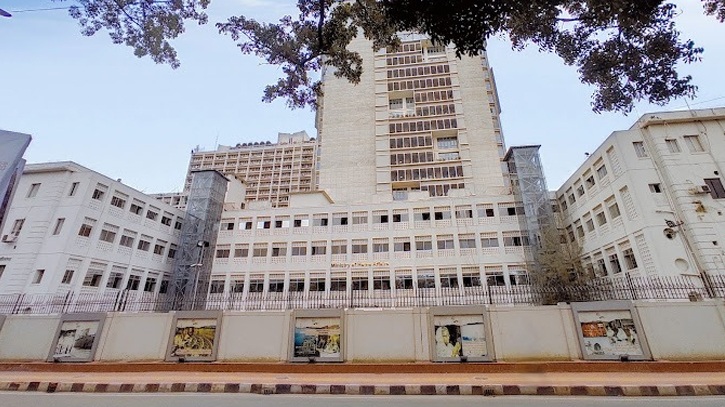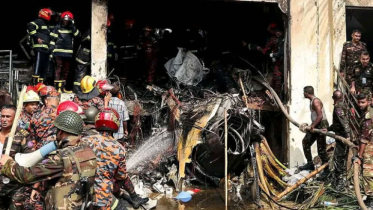
Photo: Collected
The government on Thursday (1 August) banned all political activities of Bangladesh Jamaat-e-Islami and its various wings, including Bangladesh Islami Chhatrashibir.
The home ministry issued a gazette notification in the afternoon in this regard.
Earlier on Monday (29 July) the Awami League-led 14-party alliance unanimously recommended banning Jamaat-Shibir after a meeting chaired by AL President and Prime Minister Sheikh Hasina at the Ganabhaban.
"The alliance has agreed to ban Jamaat-Shibir politics on the charges of killing common people and destroying state assets by creating various issues and carrying out militant attacks," AL General Secretary Obaidul Quader said after the meeting that day.
At the meeting, Prime Minister Sheikh Hasina labelled the recent events surrounding the quota reform movement as militant activities, attributing the attacks to Jamaat-Shibir and BNP.
She stated, "The events in Bangladesh are not political but militant acts."
Home Minister Asaduzzaman Khan Kamal Wednesday (31 July) said the process to ban Jamaat-Shibir is underway and a notification can be issued anytime in this regard.
Soon after Bangladesh's independence, the 1972 constitution banned the formation and functioning of any association or union or political parties on the basis of religion.
It was a watershed moment.
In the era before, the Jamaat-e-Islami Bangladesh, initially led by Syed Abul Ala Maudidi, had actively opposed the independence of Bangladesh.
It was an echo of the party's past, which had vehemently opposed partition.
The constitution, however, was clear in its phrasing.
Article 38 of the constitution read: "Every citizen shall have the right to form associations or unions, subject to any reasonable restrictions imposed by law in the interests of morality or public order: Provide that no person shall have the right to form, or be a member or otherwise take part in the activities of any communal or other association or union which in the name or on the basis of any religion has for its object, or pursues, a political purpose."
The 1972 ban on religious parties meant an end to Jamaat's presence in the political scene. But this was to be short-lived.
Just four years later, the military government led by Ziaur Rahman swept to power.
Zia inserted the Islamic phrase Bismillah in the constitution's preamble and replaced "secularism" with "Absolute Trust and Faith in the Almighty Allah".
He then went further. He repealed the ban by issuing a martial law proclamation, which allowed the formation and functioning of organisations based on religion.
He, however, did not touch the Special Powers Act (SPA) 1974.
"No person shall form, or be a member or otherwise take part in the activities of, any communal or other association or union which in the name or on the basis of any religion has for its object, or pursues, a political purpose," says Sub-section 1 of Section 20 of the SPA.
This section soon morphed into a tool to suppress opponents, while still turning a blind eye to the ban on politicising religion.
The SPA, in the case of Zia's government, wasn't consulted when it came to the question of Jamaat.
Jamaat, in turn, began to flourish, solidifying its position as the largest Islamist party in the country.
But it wasn't the only party which was bolstered by the repeal.
By 2007, according to government intelligence agencies' records, about 100 Islamic political parties and organisations had gained a foothold in the political spectrum.
For Jamaat, the repeal meant a quick change in fortune. In 1986, Jamaat contested the polls and even secured 10 seats. By 1991, this had grown to 18 seats.
The chaos leading up to the 1996 elections meant Jamaat's vote bank was compromised. But this would mean little in the 2001 election.
This time, Jamaat came to the polls in a four party alliance, including the giants, BNP.
By the end, the alliance won and Jamaat secured 17 seats. The alliance received a drubbing in the very next elections to the Grand Alliance, led by the Awami League.
Jamaat's tryst with the BNP would come back to haunt them.
In 2013, its deputy, Delwar Hossain Sayeedi, was sentenced to death. Two more death sentences for its other members would follow.
With the AL in power, the High Court in 2013 cancelled the registration of the party.
Another chapter of the party, Jamaat-e-Islami (J&K) was banned in India in 2019.
In Russia, the party has remained banned since 2003.
In Bangladesh, the ban pushed Jamaat to the background of political conversations. When Jamaat did come up, it was mostly in association with different violent crimes, such as arson attacks and hacking.
Now, the government is finally mulling banning the party for good.
It remains to be seen what the future holds.
Messenger/Nishat








